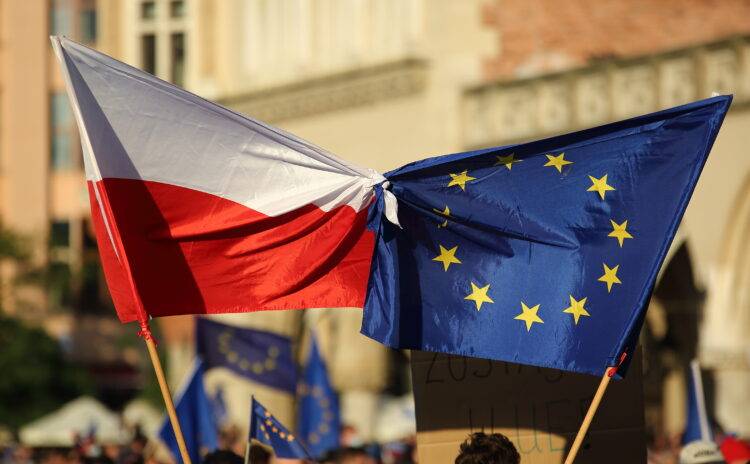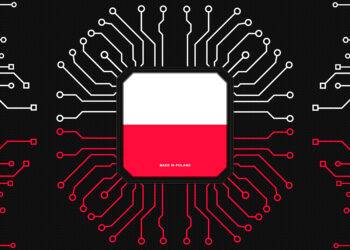On May 1, 2004, Poland embarked on what many considered a groundbreaking journey by joining the European Union, an act that was seen as breaking the “curse of history” according to many of its citizens and leaders. Celebrating 20 years of membership, Poland reflects on a period of significant transformation that has seen its economy, infrastructure, and international standing grow, albeit accompanied by a growing sense of skepticism and discord over the direction and benefits of EU membership.
The night Poland joined the EU was marked by nationwide celebrations, symbolized by the significant gathering in Warsaw’s Plac Piłsudski where key figures of the state and thousands of citizens witnessed the raising of the EU flag while “Ode to Joy” played, a poignant moment of collective pride and emotion.
The festive atmosphere on the night of accession saw crowds gather, filled with a palpable sense of participation in a historic event.
Celebrations and reflections come at a time when Europe faces numerous challenges, yet the integration into the EU is regarded by many as a fulfillment of historical justice for Poland. European Affairs Minister Szłapka commented on the anniversary, stating, “When we recall the emotions associated with May 1, 2004, it was a fulfillment of historical justice. After two decades of membership in the EU, we have reached maturity; now it is time for wise, Polish leadership.”
This era of initial euphoria, however, has faced tests over time.
Shift in Public Perception and Current Challenges:
Over the years, the public’s perception has shifted from overwhelming support to cautious skepticism, fueled by internal political shifts and external pressures. Today, support for the EU has dropped from 92 percent in 2022 to 77 percent.
“The same flag, once raised with pride in the most important place of the capital, by the previous government was taken out of the most important offices in the country and referred to as a ‘rag’. There are demonstrations where Brussels is equated with Moscow, and banners calling for Polexit are displayed.”
The Union fell victim to populists, negative PR, ridicule, and internal scandals in Brussels.
Yes, it’s still the majority, so there’s no reason to worry, but there’s a disturbing trend. It is certainly not the case that opponents of the European Union only make erroneous arguments, and its enthusiasts only good ones.
The fact is that the Union is not flawless, and there have been mistakes made by Union officials that have sometimes led entire nations, social groups, or minorities to outrage.
Economic Growth and Structural Changes:
Despite political controversies, Poland’s economic trajectory in the EU has been largely positive. Former economic advisor highlighted the stark economic advancements, noting, “When we joined the EU, the average income per capita in Poland was about 40 percent of that in Germany, and today it stands at about 70 percent. We have become one of the fastest-growing economies in Europe.” This growth is attributed to massive infrastructure projects funded by EU money, improving living standards, and increasing Poland’s competitiveness on the European stage.
Since joining the EU, Poland has seen a remarkable transformation. The country’s GDP has nominally increased three-and-a-half times, GDP per capita has quadrupled, and unemployment has dropped from 19 percent to around 3 percent. These changes underscore Poland’s successful integration into the EU’s economic framework. Minister Szłapka highlighted the benefits, “The huge benefit of EU membership is also access to the single market. I mention this because usually, the focus is mainly on structural funds. They are also very important because – excluding membership fees – over the past twenty years, more than 163 billion euros have come to Poland.”
“Over these 20 years, Poland has become one of the fastest-growing economies in Europe and, in a way, we have covered a huge part of the distance in terms of income, which was growing over centuries. We are dealing with a historic success, although every economist will add that there is still a missing 20-30 percent. And that is the task for the coming years,” emphasizes Professor Orłowski, an economist.
The economist emphasizes that “compared to Western Europe, labor productivity in Poland has grown tremendously. This was followed by an increase in wage levels, income levels.” – A stronger economy is also backed by stronger money – despite troubles, despite inflation, and remember, these 20 years were a series of massive crises in Europe and the world – our income more than doubled – says Prof. Orłowski.
“However, considering the net wages, I would like to remind just this much that when Poland was joining the EU, the wage in the UK was six times higher than in Poland. This caused several hundred thousand people to move to the UK, and today, the British wage is twice the Polish one, while remembering that there are higher costs of living there,” he emphasized.
“Prof. Orłowski says that ‘in the span of 20 years we have changed from a country from which it was most beneficial to emigrate for economic reasons, to a country from which it is no longer worthwhile to leave, on the contrary – now we are worried whether perhaps too many immigrants might come to us, because Poland provides a good life’.”
The economist highlights that there has been an improvement in the living standards, and contrary to what most Poles believe, the main benefit is not the transfers associated with funds, but rather a quicker economic growth. – Thanks to this, it was worth investing in Poland, it was worth building factories with the whole of Europe in mind. All these things happened because Poland is in the EU, and as a result, our economic growth was twice as fast as if Poland was not in the EU, emphasizes the economist.
Local Impact and Municipal Development:
Throughout Poland, the signs of EU influence are visible in the numerous infrastructure projects partially funded by EU funds, which have modernized towns and villages making them more modern, friendly to various groups, and aesthetically pleasing. This modernization reflects the wealth generated through the common market, as Minister Szłapka explains, “If we walk down the street of any Polish city or village, we will see a lot of plaques informing that various infrastructure projects are co-financed with EU funds. But we will also see that these localities are simply more modern, friendly to various groups, more beautiful – and this results from the fact that their residents have enriched themselves, thanks to the common market.”
At the municipal level, EU membership has facilitated significant development projects that would have been unattainable otherwise. The Mayor of Myszkow pointed out, “Looking back at the years that have passed, frankly, many things simply would not have happened without EU funds.” However, he also noted the bureaucratic delays that sometimes hinder the swift implementation of projects and called for more efficiency in processing EU-funded initiatives.
Broader Societal Benefits and Challenges:
On a societal level, EU membership has brought about substantial legislative and judicial changes, safeguarding democracy and rule of law in Poland, which some feared could follow the paths of countries like Turkey or Russia without such support. “Thanks to mechanisms such as the preliminary ruling requests from Polish judges to the European Court of Justice, we have been able to protect our rule of law,” stated a young legal scholar and activist, highlighting the critical role of EU legal frameworks in maintaining democratic standards in Poland.
“The European Union is not just about large and intricate processes of defending democracy – it addresses and lists issues related to the protection of franc – loan holders and consumers who have fallen victim to unfair practices. As it explains, Polish courts pass verdicts in these cases, but due to the decisions of the European Court of Justice and EU directives, which care strongly about the position of the weaker party in economic trade.”
“- The European Union also includes the European Arrest Warrant, which has greatly hindered criminals from escaping responsibility,” he adds.
It also emphasizes that even the first area of protection against discrimination of people from the LGBT+ community, namely the Labor Code, has been adapted in this regard to European Union law.
Future Outlook and the Need for Reform:
While celebrating the past successes, Polish officials also acknowledge the challenges ahead. Minister Szłapka noted that although the EU is not a perfect project and some of the European Commission’s proposals must be approached critically, Poland aims to build broad coalitions for changes that will make the Union “even more effective.” He emphasized the global challenges facing both Poland and Europe and the importance of acting within the community alongside friends to secure a successful and better future for the next generations. “After two decades of membership, we have reached maturity, now it is time for wise, Polish leadership,” concluded Szłapka.
Looking forward, there is a consensus that while the EU has been beneficial, there are areas that require reform and more democratic engagement. Suggestions include enhancing the powers of the directly elected European Parliament and addressing the EU’s public relations issues to better communicate its successes and benefits to the citizens. “The Union is not perfect… like a car, sometimes you need to change parts and make necessary repairs,” noted an EU policy expert, emphasizing the need for ongoing adjustments to maintain and improve the union.
Conclusion:
As Poland marks 20 years of EU membership, it finds itself at a crossroads, balancing between the substantial benefits received and the challenges that lie ahead. The journey has been transformative, but the path forward requires a nuanced approach to address both internal divisions and external pressures, ensuring that Poland continues to thrive within a rapidly changing Europe. The nation’s experience encapsulates a broader European narrative of integration, growth, and the continuous pursuit of a more cohesive, resilient Union.


















